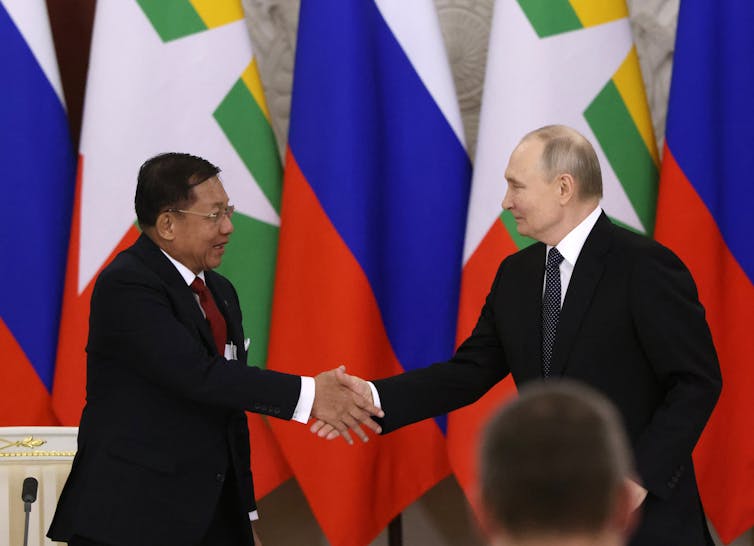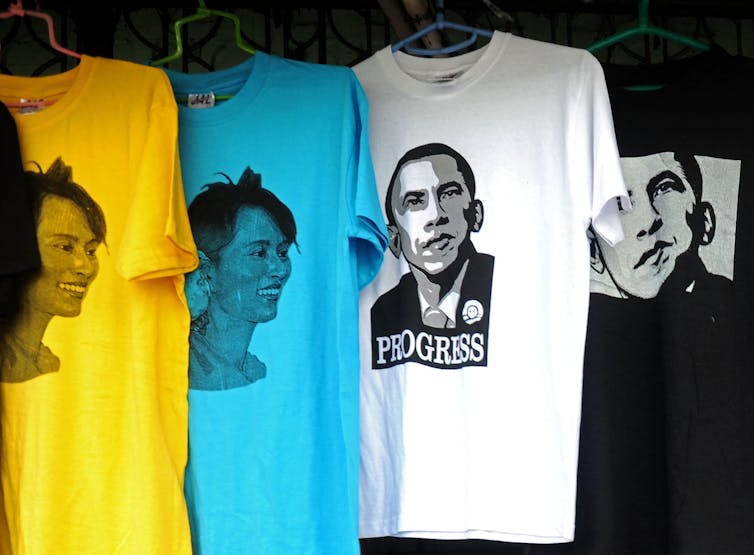Detta inlägg post publicerades ursprungligen på denna sida this site ;
Date:
Author: Tharaphi Than, Associate Professor of World Cultures and Languages, Northern Illinois University
Original article: https://theconversation.com/myanmars-civil-war-how-shifting-us-russia-ties-could-tip-balance-and-hand-china-a-greater-role-251782
While the United States talked military assistance and minerals with Ukraine, Russia did the same with one of its few remaining allies: Myanmar.
On March 4, 2025, the commander in chief and leader of Myanmar, Min Aung Hlaing, visited Russia. It was his fourth official visit since a coup in 2021 saw the military seize power.
That coup ended a decade-long power-sharing arrangement between the army and the democratically elected government in Myanmar, sparking peaceful protests that soon developed into a nationwide armed resistance known as the Spring Revolution and an ensuing government crackdown.
The resulting civil war – now into its fourth year – has seen 6,000-plus people killed, 29,000 arrested and more than 3.3 million displaced, according to estimates from the human rights group Assistance Association for Political Prisoners. The conflict pits the country’s military, which has had a stranglehold on Myanmar’s politics for much of the past six decades, against a broad-based opposition that includes ethnic minority groups like the Karen National Union, Kachin Independence Army, Arakan Army, Ta’ang National Liberation Army, Myanmar National Democratic Alliance Army, People’s Defense Force and Bamar People’s Liberation Army.
With seemingly no immediate end to the fighting in sight, all sides are becoming increasingly reliant on foreign suppliers of weapons and fuel.
And this prompts an important question: Could the shifting policies and alignments of global powers – notably China, Russia and the U.S. – tip the balance of Myanmar’s civil war?
Russia: Myanmar’s ‘forever friend’
Throughout the civil war, Myanmar’s generals have turned to Russia for support. Both nations are heavily sanctioned and seen as “pariah states,” so it is, in many ways, a convenient alignment.

Getty Images
In his latest visit to Moscow, Min Aung Hlaing granted Russia rights to extract minerals in Myanmar’s conflict zones and build an oil refinery and a port in the coastal city Dawei.
Russia has exported oil to Myanmar for many decades. Since the invasion of Ukraine, Moscow has been using the Southeast Asian country as a route to transport oil to China in an attempt to mitigate the impact of Western sanctions on energy exports. Myanmar has also agreed to supply skilled workers to Russia in a deal to alleviate the country’s labor shortages.
This mutual arrangement also extends to defense and security matters. Myanmar and Russia engage in joint naval exercises, and Moscow is a top supplier of weapons to Myanmar’s generals and trains personnel for the military government.
But any diplomatic benefit from having Russia as a sponsor has been blunted due to Moscow’s loss of international support over the war in Ukraine. Should that change, as the new U.S. administration seems keen on, then it could benefit Myanmar’s military by giving the generals a stronger ally on the international stage.
As such, warming relations between Russia and the U.S. could be to the detriment of Myanmar’s myriad opposition groups. Already, the Trump administration’s policies mean that the resistance can no longer rely on the same level of support from Washington, and it’s no guarantee that European Union countries – already facing the prospect of withdrawn U.S. support for Ukraine – would step in to fill the gap.
US pivots away from Myanmar
Washington has nominally supported the Spring Revolution.
The U.S. provides shelter to Myanmar dissidents, including exiled leaders of the National Unity Government, or NUG, and has pushed for sanctions against the army.
But that support has been largely symbolic. The U.S. still has not officially recognized the NUG as the legitimate government of Myanmar – a decision that prevents Washington from releasing US$1 billion held at the Federal Reserve to the democratic representatives. That money could be used both to bolster the resistance and deliver much-needed aid to the country’s people.
U.S. foreign policy as it evolves under the Trump administration is having further ripples in Myanmar.
The Trump White House has gutted the U.S. Agency for International Development, the department tasked with funding Myanmar through 2023’s Burma Act, which authorized sanctions on the military, support for those opposing the junta and assistance for Myanmar’s people.
Services such as Voice of America and Radio Free Asia have been suspended amid the recent U.S. cutbacks. As a result, people in Myanmar have more-limited access to reliable information and, more importantly, fewer media to represent and amplify their voices.
Whether the U.S. chooses to continue to support the opposition or engage with the military government and endorse Myanmar elections expected for later this year could have wide implications for the future of democracy in the country.

Soe Than Win/AFP via Getty Images
Myanmar has witnessed such a U.S. reversal before.
For a long period, Washington supported the opposition’s boycott of elections that guaranteed the power to the military. But in 2009, the U.S. administration under Barack Obama sent a message to the National League for Democracy (NLD), which at the time was under the leadership of now-imprisoned Nobel laureate Aung San Suu Kyi, that Washington would recognize the military’s elections as part of a policy of “pragmatic engagement” with the then-ruling junta.
It forced the recalcitrant NLD to cooperate by entering the 2012 by-elections – the first time it had taken part in elections since 1990.
Although the NLD won a sweeping victory – and went on to win the 2015 national vote – it meant giving legitimacy to a system rigged in favor of the military, with a quarter of parliamentary seats reserved for officers. Given that 75% approval was needed for any constitutional reform, it meant that the NLD could form a government but could only make decisions with the consent of the still-powerful generals.
The political situation now is different from 2012. The yearslong resistance has weakened the military significantly. And even if the NUG, which consists of member of the NLD and other political parties, does feel compelled to participate in elections, the various other resistance groups and ethnic armies will likely choose otherwise. Regional autonomy has become a reality as a result of the decentralized nature of the resistance movement; elections will not satisfy the various demands for autonomy.
Chinese push for stability
The U.S. administration’s reduction in aid and, potentially, support for Myanmar’s opposition could lead the way to China taking a greater role in shaping the course of the civil war.
Beijing, like Washington, had traditionally had a close relationship with the opposition NLD. President Xi Jinping visited Myanmar in 2020 and signed a series of infrastructure deals as part of China’s Belt and Road Initiative.
After the 2021 coup, China initially drew back from supporting Myanmar. But Beijing has since attempted to revive stalled or canceled bilateral projects while supporting reconciliation efforts and positioning itself as a neutral mediator.
China’s main concern is spillover from the war. For that reason, Beijing became concerned when an alliance of armed ethnic groups launched a major anti-military push in October 2023, fearing the spread of instability across the China-Myanmar border.
Since the civil war broke out, Chinese investments in Myanmar have stalled. Meanwhile, lawlessness inside Myanmar has led to the growth of mostly Chinese-run online scam centers – victims of which include Chinese citizens who have been kidnapped, trafficked and forced to work as scammers.
What China wants most is a stable Myanmar. Yet its chosen strategy to try to bring this about – forcing warring parties to sign ceasefire agreements – hasn’t worked so far.
This could change. The reduction of U.S. aid in Myanmar places an additional burden on ethnic resistance groups – they now have to shoulder more of the burden of providing for the people while fighting for autonomy. As such, resistance groups might be under greater urgency to accept China’s role as a mediator. And with that changed calculus, the imperative to find a negotiated solution may increase.
But a rushed ceasefire born of necessity does not equate to a lasting solution. As such, the shifting geopolitics of Russia, the U.S. and China may impact Myanmar’s civil war – but it will do little to encourage democracy in the country, nor put it on a path to lasting peace.

